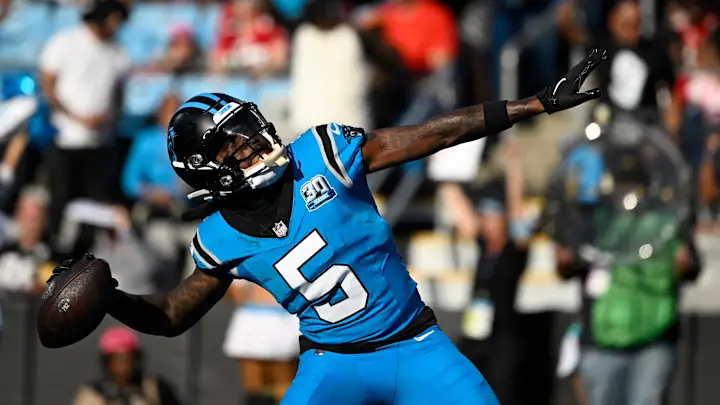Panthers’ Trade Blunders: Kelvin Benjamin and Diontae Johnson
The Carolina Panthers have experienced their fair share of trade missteps over the years, with two particular transactions standing out as emblematic of poor decision-making: the acquisition of wide receiver Kelvin Benjamin and the trade for Diontae Johnson. Both moves, in hindsight, appear to be among the most detrimental in the NFL over the past decade.
Kelvin Benjamin: A Promising Start Turned Sour
The Draft Day Hope
In 2014, the Panthers selected Kelvin Benjamin with the 28th overall pick in the NFL Draft. Coming off a standout season at Florida State, where he helped lead the Seminoles to a national championship, Benjamin was expected to fill the void left by the departure of veteran wide receivers like Steve Smith and Brandon LaFell. His 6’5″, 245-pound frame and ability to make contested catches made him an appealing prospect.
Early Success
Benjamin’s rookie season was promising. He recorded over 1,000 receiving yards and nine touchdowns, quickly becoming a favorite target for quarterback Cam Newton. His debut performance against the Tampa Bay Buccaneers, where he caught six passes for 92 yards and a touchdown, set the tone for a productive first year.
Injury and Decline
However, Benjamin’s trajectory took a downturn in 2015 when he suffered a torn ACL during training camp, sidelining him for the entire season. Upon his return in 2016, he showed flashes of his former self but struggled with consistency. By 2017, his performance had declined, leading to his trade to the Buffalo Bills mid-season. In Buffalo, Benjamin’s issues persisted, culminating in his release in 2018 after a series of underwhelming performances.
The Fallout
The Panthers’ decision to invest a first-round pick in Benjamin ultimately yielded limited returns. His inability to maintain peak performance and his subsequent release by multiple teams underscored the miscalculation. The opportunity cost of passing on other potential contributors in the 2014 draft, such as wide receivers like Jarvis Landry or tight ends like Travis Kelce, further highlights the trade’s negative impact.
Diontae Johnson: A Rollercoaster Journey
Initial Expectations
In March 2024, the Panthers traded cornerback Donte Jackson and a draft pick to the Pittsburgh Steelers for wide receiver Diontae Johnson. Johnson, a former Pro Bowler, was expected to provide a reliable target for rookie quarterback Bryce Young. His route-running prowess and ability to gain separation were seen as assets that could accelerate Young’s development.
On-Field Performance
Johnson’s tenure with the Panthers was brief. Over seven games, he led the team in receiving yards and touchdowns. His standout performance came against the Las Vegas Raiders, where he recorded eight receptions for 122 yards and a touchdown. Despite these flashes of brilliance, the Panthers’ overall offensive struggles persisted.
Off-Field Issues and Trade to Baltimore
Behind the scenes, Johnson’s behavior raised concerns. Reports indicated conflicts with teammates and coaching staff, leading to his suspension and eventual trade to the Baltimore Ravens in October 2024. His time with the Ravens was similarly tumultuous, marked by disciplinary issues and a refusal to play in a game, resulting in his release.
The Missed Opportunity
The Panthers’ decision to trade for Johnson, only to part ways with him shortly thereafter, exemplifies poor roster management. The team not only invested resources in acquiring Johnson but also retained a portion of his salary, compounding the financial misstep. The lack of a clear plan for integrating Johnson into the offense and the subsequent fallout reflect deeper organizational issues.
Comparative Analysis: A Pattern of Missteps
Both the Kelvin Benjamin and Diontae Johnson trades share common themes:
- Overvaluation of Talent: In both instances, the Panthers placed undue faith in players whose past performances were not indicative of future success.
- Inadequate Assessment of Character: Both players exhibited behavioral issues that were not adequately addressed before acquisition.
- Poor Return on Investment: The Panthers failed to recoup value commensurate with their investments, both in terms of draft capital and financial resources.
These trades underscore a pattern of decision-making that prioritizes immediate needs over long-term stability and growth.
Broader Implications for the Panthers
The repercussions of these trades extend beyond the individual players involved. They reflect a broader organizational strategy that has often favored short-term fixes over sustainable development. The Panthers’ struggles to build a consistent and competitive roster can be traced back to such missteps, highlighting the importance of thorough evaluation and strategic planning in roster construction.
The Kelvin Benjamin and Diontae Johnson trades serve as cautionary tales for NFL teams. They illustrate the risks associated with overvaluing talent based on past performance without considering future potential and character. For the Panthers, these transactions represent missed opportunities and lessons in the importance of comprehensive evaluation in team-building efforts.



